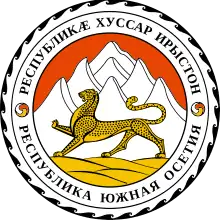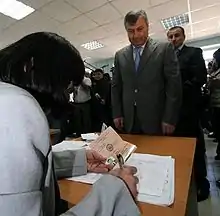2009 South Ossetian parliamentary election
A parliamentary election in South Ossetia, a breakaway region of Georgia recognised as an independent state by Russia and Nicaragua, was held in June 2009.[1] According to the preliminary results, the highest number of votes went to the ruling Unity Party.[2] Two opposition parties were not permitted to run out of concern that they might not be loyal to Eduard Kokoity, the President of South Ossetia.[3][4][5]
| |||||||||||||||||||||
34 seats in the Parliament 18 seats needed for a majority | |||||||||||||||||||||
|---|---|---|---|---|---|---|---|---|---|---|---|---|---|---|---|---|---|---|---|---|---|
This lists parties that won seats. See the complete results below. | |||||||||||||||||||||
| |||||||||||||||||||||
 |
|---|
| This article is part of a series on the politics and government of South Ossetia |
| See also |
Under laws of Georgia, the elections were illegal.[6]
The European Union,[5][7][8] the United States,[9] and NATO[10] have issued statements saying these organisations consider the elections illegal, and have rejected their results.
Background
The Republic of South Ossetia has a population of about 70,000. It has had de facto independence from central Georgian rule since the 1991–1992 South Ossetia War. After the August 2008 South Ossetia war, Russia recognized the independence of South Ossetia, followed by Nicaragua. Other countries, including Georgia, consider South Ossetia part of Georgia's constitutional territory.[11]
Campaign

Four parties were contesting for 34 seats in the Parliament of South Ossetia. According to the central election commission, 45,000 people were registered to vote on Sunday.[12] This was the first South Ossetian election since the republic obtained its limited international recognition in 2008. The election was observed by over 70 observers from 10 countries,[1] including representatives from Abkhazia, the Czech Republic, Germany, Italy, Kazakhstan, Kyrgyzstan, Moldova, Nagorno-Karabakh, Ukraine, Poland, and Russia. Among the observers were Vladimir Churov, the chairman of the Central Election Commission of Russia[13] and Giulietto Chiesa, Italian MEP for Italy of Values, former member of the Italian Communist Party.[14][15]
About 100 Russian and international reporters arrived in South Ossetia to cover the event.[16] Voters were able to cast ballots at 95 polling stations, 88 in South Ossetia and 7 in Russia (6 of them opened in North Ossetia and 1 in Moscow). No other overseas polling stations were open.[17]
Structure
The election was conducted using the party-list proportional representation system with a 7% election threshold. For South Ossetian authorities to consider the election valid, the voter turnout would have been at least 50% + 1 vote, and at least two parties would have acquired securing seats in the parliament. If these criteria hadn't been fulfilled, the South Ossetian legislation provided for a repeat election in four months.[18]
Parties
The following parties participated in the election:[19]
- Unity Party
- Communist Party of South Ossetia
- People's Party of South Ossetia
- Fatherland Socialist Party
The Unity Party is the ruling party in the current parliament.[14] According to Reuters, Unity, Communists, and the People's party support the current President Eduard Kokoity, while the Fatherland Socialist party opposes him.[6] Two opposition parties were barred from running.
Opinion polls
| Date of poll | Institute | Unity Party | Communist Party | People's Party | Fatherland Socialist Party | Against all | Undecided |
|---|---|---|---|---|---|---|---|
| 31 March 2009 | IA "Res" - South Ossetian governmental press service / Min. of press and mass communication | 22% | 32% | 16% | 22% | 8% | n/a |
| 21 April 2009 | IA "Res" - South Ossetian governmental press service / Min. of press and mass communication | 19% | 29% | 14% | 19% | 19% | n/a |
| 26 April - 15 May 2009 | IA "Res" - South Ossetian governmental press service / Min. of press and mass communication | 31.6% | 12.8% | 7.0% | 7.2% | 19.0% | 22.0% |
Election
As of 10:00 UTC, 59.88% of registered voters had cast their votes, crossing the electoral threshold of 50% plus one vote. The South Ossetian election commission has thus declared the elections valid.[14]
Result
| Parties | Votes | % | Seats | ||
|---|---|---|---|---|---|
| Unity Party | 21,246 | 46.32 | 17 | ||
| People's Party of South Ossetia | 10,345 | 22.55 | 9 | ||
| Communist Party of South Ossetia | 10,194 | 22.22 | 8 | ||
| Fatherland Socialist Party | 2,918 | 6.36 | 0 | ||
| Against all | 1,163 | 2.53 | – | ||
| Total (turnout 81.93%) | 45,866 | 100% | 34 | ||
| Sources: South Ossetian Electoral Commission | |||||
According to the preliminary results, the Unity Party has obtained the most votes with 46.38% of the vote, followed by People's Party with 22.58% and the Communists with 22.25%, thus securing 17, 9 and 8 parliament seats respectively, while the Fatherland Socialist Party fell just short of passing the 7% threshold with only 6.37%.[20] The official results were expected by June 7.
According to the final results of the Parliamentary elections, the Unity Party won 17 places in the Parliament with 21 246 votes, People's Party won 9 places with 10 345 votes, and Communist Party won 8 mandates with 10 194 votes.
Reaction
- International observers
- Group of 11 observers, representing Italy, Germany, Poland, and Russia noted the election was held 'complying with common democratic standards.[21] Italian MEP Giulietto Chiesa commented:[22]
These elections were a model of democracy.
 Europe
Europe- The EU refused to accept either the legality of the election or its results.[5]
- NATO
- The Secretary-General of NATO, Jaap de Hoop Scheffer said the alliance did not recognize the elections and reiterated "its full support for the sovereignty and territorial integrity of Georgia within its internationally recognized borders".[10]
 Georgia
Georgia- Georgia dismissed the election as illegitimate. Temur Iakobashvili, the State Minister for Reintegration commented:[6][22]
What they in South Ossetia call elections are very far from real elections.
Nothing but clownery, a farce and a redistribution of criminal power.
 United States
United States- The United States denounced the elections "as a step away from a peaceful and negotiated solution to the conflict" and refused to "recognize neither the legality nor the results."[9]
 Russia
Russia- Andrei Nesterenko, spokesman for the Russian Ministry of Foreign Affairs, said that the election was judged by international observers to be free and compliant with international norms, and that the election is important for the further development and democratisation of South Ossetia. On comments offered by the European Union and the United States, Nesterenko stated:[23]
They neither recognize the result, nor want to see the real situation as it unfolds. This is an attempt to deprive the South Ossetian nation of the right to build its own life independently. Such statements from the promoters of democratic norms everywhere rather harm themselves.
References
- "More than 70 observers to monitor South Ossetia elections". RIA Novosti. 2008-05-30. Retrieved 2008-05-31.
- Предварительные результаты голосования на выборах депутатов Парламента РЮО на 01:00 (in Russian). RES News Agency. 2009-06-01. Retrieved 2009-05-31.
- Postimees 31 May 2009 11:17 citing AFP, Interfax and BNS: Lõuna-Osseetia valib kohalikku parlamenti
- Radio Netherlands Worldwide 1 June 2009 06:55Z–16:34Z: South Ossetia's Kokoity wins flawed poll
- Telegraph 1 June 2009 11:30 BST: Russia ally strengthens grip on South Ossetia
- "Rebel S. Ossetia votes in post-war test for ruler". Reuters. 2009-05-31. Retrieved 2009-05-31.
- Postimees 1 June 2009 11:41: EL: Lõuna-Osseetia valimised on kehtetud
- B92 1 June 2009 12:34: EU sees S. Ossetia elections as "illegitimate" Archived 2009-06-06 at the Wayback Machine
- Georgia: "Parliamentary Elections" in South Ossetia (June 1, 2009) Archived June 7, 2009, at the Wayback Machine. The US Embassy in Georgia. June 1, 2009
- NATO Doesn’t Recognize South Ossetia Elections. Sofia News Agency. June 2, 2009
- "Rebel Georgian region holds election, tension builds". Reuters. 2009-05-31. Retrieved 2009-06-02.
- "Disputed South Ossetia holds poll". BBC News. 2009-05-31. Retrieved 2009-05-31.
- Глава ЦИК РФ приехал в Южную Осетию как наблюдатель на выборах (in Russian). RIA Novosti. 2009-05-30. Retrieved 2009-05-30.
- "S. Ossetian election body declares parliamentary poll valid". RIA Novosti. 2009-05-31. Retrieved 2009-05-31.
- Italian MEP calls vote in South Ossetia 'model of democracy', RIAN, 2009-06-03
- "S.Ossetia polls to be observed by 50 monitors, 100 reporters - electioncommission". Interfax. 2009-05-27. Archived from the original on June 6, 2009. Retrieved 2009-05-27.
- "Press-Release on RSO Parliament Election". RES News Agency. 2009-05-25. Retrieved 2009-05-30.
- В Южной Осетии началось голосование на выборах в парламент (in Russian). lenta.ru. 2009-05-31. Retrieved 2009-05-31.
- "Elections as a demonstration of independence". Georgia Times. 2009-03-17. Archived from the original on 2009-06-06. Retrieved 2009-04-15.
- Явка на выборах депутатов Парламента Республики Южная Осетия составила 81,93%. В Парламент прошли три политические партии (in Russian). RES News Agency. 2009-06-01. Retrieved 2009-06-01.
- "Archived copy". Archived from the original on 2011-08-22. Retrieved 2009-06-08.CS1 maint: archived copy as title (link)
- "US and EU attempted to "deprive South Ossetia the right to build its own life"". Russia Today. 12 June 2009. Archived from the original on 18 June 2009. Retrieved 12 June 2009.